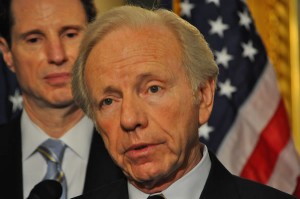National
Lieberman confident about 60 votes for ‘Don’t Ask’ repeal
Conn. senator says he’s received assurances from Collins, Lugar


Sen. Joseph Lieberman (I-Conn.) is optimistic about "Don't Ask, Don't Tell" repeal in lame duck. (Blade photo by Michael Key).
Sen. Joseph Lieberman (I-Conn.) on Thursday expressed confidence about having the necessary 60 votes to move forward with legislation containing “Don’t Ask, Don’t Tell” repeal — provided certain conditions are met with the amendment process on the Senate floor.
“I am confident that we have more than 60 votes prepared to take up the defense authorization bill with the repeal of ‘Don’t Ask, Don’t Tell’ if only there will be a guarantee of a fair and open amendment process,” Lieberman said during a news conference. “In other words, whether we’ll take enough time to do it.”
Lieberman makes the remarks after Senate Majority Leader Harry Reid (D-Nev.) said on Wednesday he’s committed to bringing to the floor in the lame duck session the fiscal year 2011 defense authorization bill, which contains language that would repeal “Don’t Ask, Don’t Tell.”
The legislation would likely come up after Dec. 1, when a Pentagon working group is due to deliver a report to Defense Secretary Robert Gates on implementing repeal.
Lieberman said he’s received assurances from GOP senators Susan Collins (R-Maine) and Richard Lugar (R-Ind.) as well as “others privately” that they would be open to moving forward with defense legislation containing “Don’t Ask, Don’t Tell” repeal provided there’s an “open amendment process” in bringing the bill to the floor.
A previous attempt in September at bringing the defense authorization bill to the floor failed when a united GOP caucus — led by Sen. John McCain (R-Ariz.) — successfully filibustered the motion to proceed.
Many senators, including Collins and Lugar, who supported a repeal amendment in committee, said they were voting “no” because of limited amendments that senators would be allowed to submit for the legislation.
In September, Reid said he was permitting three amendments to the defense authorization bill: one to strip the bill of its repeal provision, one to address the “secret holds” that senators can place on presidential nominations and another to amend the defense legislation with the DREAM Act, an immigration-related bill.
Asked during the conference what he perceived as more open amendment process the next time around, Lieberman the exact terms are up for negotiation.
“It’s hard to put a number on it now,” Lieberman said. “That’s what I hope is going to be negotiated. Of course, we’ll do our best to encourage Sen. Reid to reach out to allow and somewhat larger number.”
Lieberman said the two items that are up for negotiation are the number of amendments to be allowed and the time for debate on those amendments.
Reid has since said the DREAM Act would come to the Senate floor during lame duck as a standalone piece of legislation.
Following the news conference, Lieberman said the removal of the DREAM Act as an amendment to the defense authorization bill would “practically speaking” help with building support for moving forward with the military budget legislation.
But Sen. Jeanne Shaheen (D-N.H.), who present at the conference, said opposition to the defense authorization bill and “Don’t Ask, Don’t Tell” repeal is actually for reasons other than “how many amendments are we going to do, or long we’re going to debate.”
“This is about those who oppose this policy wanting to kill it and taking every opportunity they can and using the Senate rules to try and do that,” Shaheen said. “That’s exactly what’s going on here.”
Lieberman also maintained the Senate would have enough time to tackle “Don’t Ask, Don’t Tell” repeal as it addresses other priorities, such as a nuclear arms reduction treaty and the extension of tax cuts.
“We’re just before Thanksgiving,” Lieberman said. “We’ve been told early on that we’d be here at least three weeks. That’s a lot of time into December, so we’ll be here at least until the week before Christmas. It’s just a question of how hard we’re prepared to work to get these things done. They’re all important.”
Lieberman said President Obama “has been active” on this issue and has been in communication with Reid as well as Senate Armed Services Committee Chair Carl Levin (D-Mich.) on moving forward with the defense authorization bill with “Don’t Ask, Don’t Tell” repeal.
“I think he’ll, in my opinion, do everything he can to see that we get this done by the end of this year,” Lieberman said.
The news conference on Thursday was a hot spot for senators who advocate for “Don’t Ask, Don’t Tell.” Among the 13 lawmakers who made an appearance were Sens. Mark Udall (D-Colo.), Kirsten Gillibrand (D-N.Y.), Barbara Boxer (D-Calif.), Al Franken (D-Minn.) and Chris Coons (D-Del.) who recently took his seat after winning election in November.
Udall said Congress needs to take action to end “Don’t Ask, Don’t Tell” this year because further delay could it “could be years” for repeal to happen.
“We’ve reached an unprecedented level of gridlock here in the Senate when legislation that funds our troops provides for our national security and makes sure that we lead the world in the 21st century is blocked from even coming to the floor for debate,” Udall said. “We ought to welcome the debate — we have an idea of how that debate will turn out — but we’re going to have that opportunity to have this vote on the floor if we have courage and are steadfast.”
The senators joked among themselves that they would work through Christmas Eve — or for Lieberman, who’s Jewish, the eighth day of Hanukkah — to finish the effort in repealing”Don’t Ask, Don’t Tell.”
Sen. Roland Burris, known as a strong voice for repeal during his tenure in the Senate, said he thinks ending “Don’t Ask, Don’t Tell” would be an important victory, but noted the vote in the Senate “may come too late” for show his support.
Because he was appointed to his position in the Senate in 2009, Burris is required by Illinois state law to give up his seat to Republican Senator-elect Mark Kirk during the lame duck session of Congress and may even leave the U.S. Senate this week.
“As a black American, I know what it means to go through discrimination and unfairness, and there’s no way in the world we can have a strong military and deny those persons who are gay and lesbian … an opportunity to serve their country,” Burris said. “I support that wholeheartedly and am just sorry that I may not be here to cast the vote.”
It remains to be seen how Kirk would vote on the legislation in Burris’ stead. As a U.S. House member, Kirk voted against a “Don’t Ask, Don’t Tell” repeal amendment in May that came to the House floor.
Sen. Dianne Feinstein (D-Calif.) went a step further than other senators at the news conference when she said she believes “Don’t Ask, Don’t Tell” is unconstitutional. Some repeal advocates have been asking for President Obama to declare the law unconstitutional so he could discontinue enforcement of the law.
“I’m not a lawyer, but I believe in my heart of hearts that ‘Don’t Ask, Don’t Tell’ is unconstitutional,” Feinstein said. “As a matter of fact, a federal district court has found that that, in fact, is the case, and it’s simple because it treats the same case of people differently.”
Still, not every member of the U.S. Senate is on board with repeal. Asked during the news conference whether he had spoken to Sen. John McCain (R-Ariz.) about getting him to support an end to the law, Lieberman said he has had such conversations, but he has had “no success” in converting the Arizona senator.
Among those present at the news conference were advocates working for repeal of “Don’t Ask, Don’t Tell,” including Joe Solmonese, president of the Human Rights Campaign, Winnie Stachelberg, senior vice president for external affairs for the Center for American Progress, and Aubrey Sarvis, executive director of the Servicemembers Legal Defense Network.
Lt. Col. Victor Fehrenbach, a gay Air Force pilot who’s served in the military for 19 years, was also present at the conference and told his story about how he’s now facing potential discharge under “Don’t Ask, Don’t Tell.”
“Right now, my ‘Don’t Ask, Don’t Tell’ is somewhere in the Pentagon, and I am fighting back in federal court with SLDN and my legal team to stay in the Air Force,” he said.
Florida
AIDS Healthcare Foundation sues Fla. over ‘illegal’ HIV drug program cuts
Tens of thousands could lose access to medications

Following the slashing of hundreds of thousands of dollars from Florida’s AIDS Drug Assistance Program, AIDS Healthcare Foundation filed a lawsuit against the Florida Department of Health over what it says was an illegal change to income eligibility thresholds for the lifesaving program.
The Florida Department of Health announced two weeks ago that it would make sweeping cuts to ADAP, dramatically changing how many Floridians qualify for the state-funded medical coverage — without using the formal process required to change eligibility rules. As a result, AHF filed a petition Tuesday in Tallahassee with the state’s Division of Administrative Hearings, seeking to prevent more than 16,000 Floridians from losing coverage.
The medications covered by ADAP work by suppressing HIV-positive people’s viral load — making the virus undetectable in blood tests and unable to be transmitted to others.
Prior to the eligibility change, the Florida Department of Health covered Floridians earning up to 400 percent of the federal poverty level — or $62,600 annually for an individual. Under the new policy, eligibility would be limited to those making no more than 130 percent of the federal poverty level, or $20,345 per year.
The National Alliance of State and Territorial AIDS Directors estimates that more than 16,000 patients in Florida will lose coverage under the state’s ADAP because of this illegal change in department policy. Florida’s eligibility changes would also eliminate access to biktarvy, a widely used once-daily medication for people living with HIV/AIDS.
Under Florida law, when a state agency seeks to make a major policy change, it must either follow a formal rule-making process under the Florida Administrative Procedure Act or obtain direct legislative authorization.
AHF alleges the Florida Department of Health did neither.
Typically, altering eligibility for a statewide program requires either legislative action or adherence to a multistep rule-making process, including: publishing a Notice of Proposed Rule; providing a statement of estimated regulatory costs; allowing public comment; holding hearings if requested; responding to challenges; and formally adopting the rule. According to AHF, none of these steps occurred.
“Rule-making is not a matter of agency discretion. Each statement that an agency like the Department of Health issues that meets the statutory definition of a rule must be adopted through legally mandated rule-making procedures. Florida has simply not done so here,” said Tom Myers, AHF’s chief of public affairs and general counsel. “The whole point of having to follow procedures and rules is to make sure any decisions made are deliberate, thought through, and minimize harm. Floridians living with HIV and the general public’s health are at stake here and jeopardized by these arbitrary and unlawful DOH rule changes.”
AHF has multiple Ryan White CARE Act contracts in Florida, including four under Part B, which covers ADAP. More than 50 percent of people diagnosed with HIV receive assistance from Ryan White programs annually.
According to an AHF advocacy leader who spoke with the Washington Blade, the move appears to have originated at the state level rather than being driven by the federal government — a claim that has circulated among some Democratic officials.
“As far as we can tell, Congress flat-funded the Ryan White and ADAP programs, and the proposed federal cuts were ignored,” the advocacy leader told the Blade on the condition of anonymity. “None of this appears to be coming from Washington — this was initiated in Florida. What we’re trying to understand is why the state is claiming a $120 million shortfall when the program already receives significant federal funding. That lack of transparency is deeply concerning.”
Florida had the third-highest rate of new HIV infections in the nation in 2022, accounting for 11 percent of new diagnoses nationwide, according to KFF, a nonprofit health policy research organization.
During a press conference on Wednesday, multiple AHF officials commented on the situation, and emphasized the need to use proper methods to change something as important as HIV/AIDS coverage availability in the sunshine state.
“We are receiving dozens, hundreds of calls from patients who are terrified, who are confused, who are full of anxiety and fear,” said Esteban Wood, director of advocacy, legislative affairs, and community engagement at AHF. “These are working Floridians — 16,000 people — receiving letters saying they have weeks left of medication that keeps them alive and costs upwards of $45,000 a year. Patients are asking us, ‘What are we supposed to do? How are we supposed to survive?’ And right now, we don’t have a good answer.”
“This decision was not done in the correct manner. County health programs, community-based organizations, providers across the state — none of them were consulted,” Wood added. “Today is Jan. 28, and we have just 32 days until these proposed changes take effect. Nearly half of the 36,000 people currently on ADAP could be disenrolled in just over a month.”
“Without this medication, people with HIV get sicker,” Myers said during the conference. “They end up in emergency rooms, they lose time at work, and they’re unable to take care of their families. Treatment adherence is also the best way to prevent new HIV infections — people who are consistently on these medications are non-infectious. If these cuts go through, you will have sicker people, more HIV infections, and ultimately much higher costs for the state.”
“Patients receiving care through Ryan White and ADAP have a 91 percent viral suppression rate, compared to about 60 percent nationally,” the advocacy leader added. “That’s as close to a functional cure as we can get, and it allows people to live healthy lives, work, and contribute to their communities. Blowing a hole in a program this successful puts lives at risk and sets a dangerous precedent. If Florida gets away with this, other states facing budget pressure could follow.”
The lawsuit comes days after the Save HIV Funding campaign pressed Congress to build bipartisan support for critical funding for people living with or vulnerable to HIV. In May of last year, President Donald Trump appeared to walk back his 2019 pledge to end HIV as an epidemic, instead proposing the elimination of HIV prevention programs at the Centers for Disease Control and Prevention and housing services in his budget request to Congress.
House appropriators, led by the Republican majority, went further, calling for an additional $2 billion in cuts — including $525 million for medical care and support services for people living with HIV.
While Senate appropriators ultimately chose to maintain level funding in their version of the spending bills, advocates feared final negotiations could result in steep cuts that would reduce services, increase new HIV infections, and lead to more AIDS-related deaths. The final spending package reflected a best-case outcome, with funding levels largely mirroring the Senate’s proposed FY26 allocations.
“What the state has done in unilaterally announcing these changes is not following its own rules,” Myers added. “There is a required process — rule-making, notice and comment, taking evidence — and none of that happened here. Before you cut 16,000 people off from lifesaving medication, you have to study the harms, ask whether you even have the authority to do it, and explore other solutions. That’s what this lawsuit is about.”
National
Federal authorities arrest Don Lemon
Former CNN anchor taken into custody two weeks after Minn. church protest

Federal authorities on Thursday arrested former CNN anchor Don Lemon in Los Angeles.
CNN reported authorities arrested Lemon after 11 p.m. PT while in the lobby of a hotel in Beverly Hills, Calif., while he “was leaving for an event.” Lemon’s lawyer, Abbe Lowell, in a statement said his client was in Los Angeles to cover the Grammy Awards.
Authorities arrested Lemon less than two weeks after he entered Cities Church in St. Paul, Minn., with a group of protesters who confronted a pastor who works for U.S. Immigration and Customs Enforcement. (An ICE agent on Jan. 7 shot and killed Renee Good, a 37-year-old Minneapolis woman who left behind her wife and three children. U.S. Customs and Border Protection agents on Jan. 24 shot and killed Alex Pretti, a 37-year-old nurse who worked for the Department of Veterans Affairs, in Minneapolis.)
Lemon insists he was simply covering the Cities Church protest that interrupted the service. A federal magistrate last week declined to charge the openly gay journalist in connection with the demonstration.
“Don Lemon was taken into custody by federal agents last night in Los Angeles, where he was covering the Grammy awards,” said Lowell in his statement. “Don has been a journalist for 30 years, and his constitutionally protected work in Minneapolis was no different than what he has always done. The First Amendment exists to protect journalists whose role it is to shine light on the truth and hold those in power accountable.”
“Instead of investigating the federal agents who killed two peaceful Minnesota protesters, the Trump Justice Department is devoting its time, attention and resources to this arrest, and that is the real indictment of wrongdoing in this case,” Lowell added. “This unprecedented attack on the First Amendment and transparent attempt to distract attention from the many crises facing this administration will not stand. Don will fight these charges vigorously and thoroughly in court.”
Attorney General Pam Bondi on X confirmed federal agents “at my direction” arrested Lemon and three others — Trahern Jeen Crews, Georgia Fort, and Jamael Lydell Lundy — “in connection with the coordinated attack on Cities Church in St. Paul, Minnesota.”
Fort is also a journalist.
At my direction, early this morning federal agents arrested Don Lemon, Trahern Jeen Crews, Georgia Fort, and Jamael Lydell Lundy, in connection with the coordinated attack on Cities Church in St. Paul, Minnesota.
More details soon.
— Attorney General Pamela Bondi (@AGPamBondi) January 30, 2026
Lemon, who CNN fired in 2023, is expected to appear in court in Los Angeles on Friday.
“Freedom of the press is a cornerstone of a free society; it is the tool by which Americans access the truth and hold power to account. But Donald Trump and Pam Bondi are at war with that freedom — and are threatening the fundamentals of our democracy,” said Human Rights Campaign President Kelley Robinson on Friday in a statement. “Don Lemon and Georgia Fort were doing their jobs as reporters. Arresting them is not law enforcement it is an attack on the Constitution at a moment when truthful reporting on government power has never been more important. These are the actions of a despot, the tactics of a dictator in an authoritarian regime.”
The White House
Expanded global gag rule to ban US foreign aid to groups that promote ‘gender ideology’
Activists, officials say new regulation will limit access to gender-affirming care

The Trump-Vance administration has announced it will expand the global gag rule to ban U.S. foreign aid for groups that promote “gender ideology.”
Deputy Secretary of State Christopher Landau in a memo, titled Combating Gender Ideology in Foreign Assistance, the Federal Register published on Jan. 27 notes “previous administrations … used” U.S. foreign assistance “to fund the denial of the biological reality of sex, promoting a radical ideology that permits men to self-identify as women, indoctrinate children with radical gender ideology, and allow men to gain access to intimate single-sex spaces and activities designed for women.”
“Efforts to eradicate the biological reality of sex fundamentally attack women by depriving them of their dignity, safety, and well-being. It also threatens the wellbeing of children by encouraging them to undergo life-altering surgical and chemical interventions that carry serious risks of lifelong harms like infertility,” reads the memo. “The erasure of sex in language and policy has a corrosive impact not just on women and children but, as an attack on truth and human nature, it harms every nation. It is the purpose of this rule to prohibit the use of foreign assistance to support radical gender ideology, including by ending support for international organizations and multilateral organizations that pressure nations to embrace radical gender ideology, or otherwise promote gender ideology.”
President Donald Trump on Jan. 28, 2025, issued an executive order — Protecting Children from Chemical and Surgical Mutilation — that banned federal funding for gender-affirming care for minors.
President Ronald Reagan in 1985 implemented the global gag rule, also known as the “Mexico City” policy, which bans U.S. foreign aid for groups that support abortion and/or offer abortion-related services.
Trump reinstated the rule during his first administration. The White House this week expanded the ban to include groups that support gender-affirming care and diversity, equity, and inclusion programs.
The expanded global gag rule will take effect on Feb. 26.
“None of the funds made available by this act or any other Act may be made available in contravention of Executive Order 14187, relating to Protecting Children From Chemical and Surgical Mutilation, or shall be used or transferred to another federal agency, board, or commission to fund any domestic or international non-governmental organization or any other program, organization, or association coordinated or operated by such non-governmental organization that either offers counseling regarding sex change surgeries, promotes sex change surgeries for any reason as an option, conducts or subsidizes sex change surgeries, promotes the use of medications or other substances to halt the onset of puberty or sexual development of minors, or otherwise promotes transgenderism,” wrote Landau in his memo.
Landau wrote the State Department “does not believe taxpayer dollars should support sex-rejecting procedures, directly or indirectly for individuals of any age.”
“A person’s body (including its organs, organ systems, and processes natural to human development like puberty) are either healthy or unhealthy based on whether they are operating according to their biological functions,” reads his memo. “Organs or organ systems do not become unhealthy simply because the individual may experience psychological distress relating to his or her sexed body. For this reason, removing a patient’s breasts as a treatment for breast cancer is fundamentally different from performing the same procedure solely to alleviate mental distress arising from gender dysphoria. The former procedure aims to restore bodily health and to remove cancerous tissue. In contrast, removing healthy breasts or interrupting normally occurring puberty to ‘affirm’ one’s ‘gender identity’ involves the intentional destruction of healthy biological functions.”
Landau added there “is also lack of clarity about what sex-rejecting procedures’ fundamental aims are, unlike the broad consensus about the purpose of medical treatments for conditions like appendicitis, diabetes, or severe depression.”
“These procedures lack strong evidentiary foundations, and our understanding of long-term health impacts is limited and needs to be better understood,” he wrote. “Imposing restrictions, as this rule proposes, on sex-rejecting procedures for individuals of any age is necessary for the (State) Department to protect taxpayer dollars from abuse in support of radical ideological aims.”
Landau added the State Department “has determined that applying this rule to non-military foreign assistance broadly is necessary to ensure that its foreign assistance programs do not support foreign NGOs and IOs (international organizations) that promote gender ideology, and U.S. NGOs that provide sex-rejecting procedures, and to ensure the integrity of programs such as humanitarian assistance, gender-related programs, and more, do not promote gender ideology.”
“This rule will also allow for more foreign assistance funds to support organizations that promote biological truth in their foreign assistance programs and help the (State) Department to establish new partnerships,” he wrote.
The full memo can be found here.
Council for Global Equality Senior Policy Fellow Beirne Roose-Snyder on Wednesday said the expansion of the so-called global gag rule will “absolutely impact HIV services where we know we need to target services, to that there are non-stigmatizing, safe spaces for people to talk through all of their medical needs, and being trans is really important to be able to disclose to your health care provider so that you can get ARVs, so you can get PrEP in the right ways.” Roose-Snyder added the expanded ban will also impact access to gender-affirming health care, food assistance programs and humanitarian aid around the world.
“This rule is not about gender-affirming care at all,” she said during a virtual press conference the Universal Access Project organized.
“It is about really saying that if you want to take U.S. funds — and it’s certainly not about gender-affirming care for children — it is if you want to take U.S. funds, you cannot have programs or materials or offer counseling or referrals to people who may be struggling with their gender identity,” added Roose-Snyder. “You cannot advocate to maintain your country’s own nondiscrimination laws around gender identity. It is the first place that we’ve ever seen the U.S. government define gender-affirming care, except they call it something a lot different than that.”
The Congressional Equality Caucus, the Democratic Women’s Caucus, the Congressional Hispanic Caucus, the Congressional Asian and Pacific American Caucus, and the Congressional Black Caucus also condemned the global gag rule’s expansion.
“We strongly condemn this weaponization of U.S. foreign assistance to undermine human rights and global health,” said the caucuses in a statement. “We will not rest until we ensure that our foreign aid dollars can never be used as a weapon against women, people of color, or LGBTQI+ people ever again.”
-

 District of Columbia5 days ago
District of Columbia5 days agoEleanor Holmes Norton ends 2026 reelection campaign
-

 Opinions5 days ago
Opinions5 days agoICE agents murder another American citizen in Minneapolis
-

 Honduras5 days ago
Honduras5 days agoCorte IDH reconoce a Thalía Rodríguez como familia social de Leonela Zelaya
-

 Books5 days ago
Books5 days ago‘The Director’ highlights film director who collaborated with Hitler




















